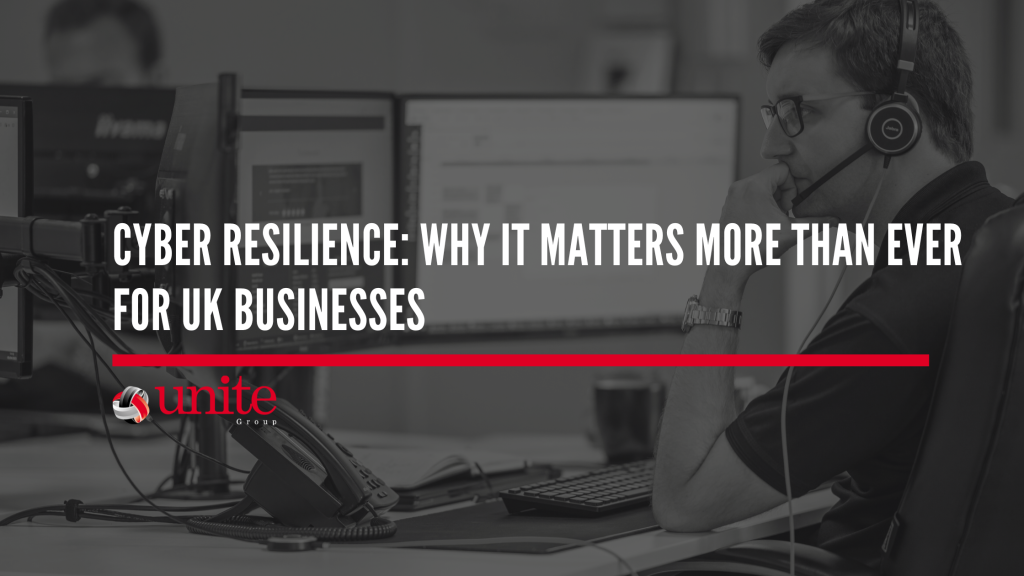
Cyber attacks are becoming more frequent, more advanced, and more damaging. No longer limited to large corporations, these threats are now targeting organisations of every size, especially those in the small to medium business space. To respond effectively, businesses need more than just firewalls and antivirus software. They need cyber resilience.
Cyber resilience is the ability to prepare for, respond to, and recover from cyber threats while maintaining core business operations. Unlike traditional cyber security, which focuses on keeping threats out, cyber resilience accepts that some breaches may still occur and focuses on limiting the damage and bouncing back quickly.
Why Cyber Resilience Is a Priority in 2025
Recent data from the UK government’s Cyber Security Breaches Survey shows that 43% of UK businesses reported a cyber attack or breach within the last 12 months. These aren’t just isolated incidents. They include phishing scams, ransomware attacks, and exploitation of outdated systems.
Threat groups like Scattered Spider have recently gained attention for targeting UK retailers using social engineering tactics to gain access to internal systems. Their techniques often rely on tricking employees rather than exploiting software flaws, making awareness and response just as important as prevention.
With new threats emerging all the time, having strong cyber defences is no longer enough. Businesses must ensure they can also detect, contain, and recover from attacks. This is the core of cyber resilience.
What Does Cyber Resilience Look Like?
Building cyber resilience involves more than just installing software. It’s a strategic, layered approach that includes people, processes, and technology working together. Here are some of the key components:
1. Risk Assessment and Planning
Start by identifying which systems and data are critical to your operations. Then assess what might happen if they were compromised. This helps you understand your exposure and set priorities for protection and recovery.
2. Incident Response Plans
Having a written and tested response plan can make the difference between a minor disruption and a major crisis. These plans should outline what steps to take if your business is hit by a cyber attack, who is responsible for each action, and how to maintain operations during recovery.
3. Ongoing Employee Training
Cyber criminals often rely on human error. Phishing emails and fake login screens are still common attack methods and affect cyber resilience. Regular training helps your team recognise red flags and respond correctly when something feels off.
4. System Updates and Patch Management
Unpatched software is a major vulnerability. Apply updates regularly across all systems and devices. Automating this process can reduce the risk of critical gaps going unnoticed.
5. Data Backup and Recovery
Secure, regular backups are essential. They allow you to restore data quickly if systems are encrypted by ransomware or suffer hardware failure. Test your backups often to make sure they work as expected.
Cyber Resilience and Government Legislation
The UK government continues to take cyber security seriously. The upcoming Cyber Security and Resilience Bill is expected to introduce stricter requirements for how companies manage and report cyber incidents. This will likely affect a wider range of businesses than previous laws, especially those involved in critical services or handling large amounts of personal data.
By investing in cyber resilience now, businesses can stay ahead of these regulations and avoid last-minute scrambles to meet compliance deadlines. It also sends a clear message to clients and stakeholders that you take data security seriously.
How The Unite Group Supports Cyber Resilience
At The Unite Group, we help organisations across the UK strengthen their defences, improve their processes, and recover faster when things go wrong. Our cyber support services include:
- Security audits and risk assessments tailored to your business
- Design and implementation of incident response plans
- Staff training to improve cyber awareness
- Guidance on Cyber Essentials and Cyber Essentials Plus certification
- Ongoing monitoring and support for evolving threats
We work with you to build a clear, practical strategy that fits your budget and your risk profile. Whether you’re starting from scratch or improving on existing policies, we help you make confident, informed decisions about your cyber resilience
Final Thoughts
No business is completely immune to cyber threats. Preparing for that possibility is no longer optional. Cyber resilience gives your business the ability to adapt, absorb the impact, and recover quickly without long-term damage.
The cost of downtime, reputational harm, and data loss can be high. By taking action today, means you are better equipped when handling whatever comes tomorrow. If you want to take the next step toward building a stronger, safer business, we are here to help.
Speak to The Unite Group today about how we can support your journey to greater cyber resilience.
